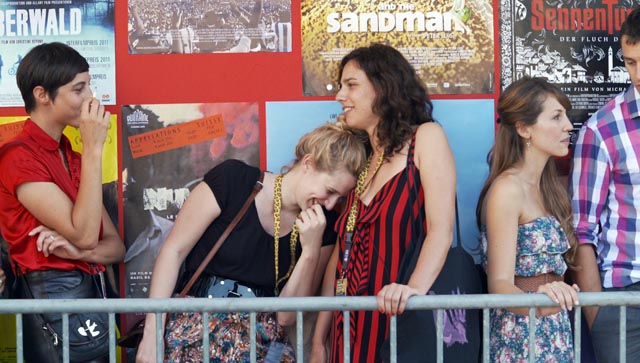Today sees first screenings of three more features in New York’s New Directors/New Films series. Earlier: Blue Caprice and Tower and three rounds of three each: 1, 2, and 3.
We begin with Steve Macfarlane in Slant: “Jazmín López’s Leones is a classically mundane scenario, executed beautifully in 35mm: angst-ridden teenagers go for a stroll in the forest, rigorously shot in keeping with the current chic in art cinema for ominous, slow-burn long takes. On this basis, the film demands respect, as López’s adroit harnessing of natural light and ambient noise to construct a lush flow of image and sound brings to mind the work of Terrence Malick, Lucrecia Martel, and Gaspar Noé. As the frame hovers around each kid during their interminable hike through trees and fields, the narrative breaks down, roughly, to each individual breath of each individual member’s leg of the journey, often before gliding backward or forward to catch up to somebody else for a spell.”
For Peter Labuza, Leones is “a journey of the spirit—a film that doesn’t just imply cinema can depict a spiritual journey, but can itself be a spiritual journey. This is a film that takes the camera and morphs it into Virgil, Dante’s guide through the beyond. Have I mentioned yet that Leones is an outright masterpiece and perhaps one of the great works of world cinema of our contemporary moment? Allow the hyperbole.”
“At once a fairy tale, a puzzle film and a metaphysical mystery, Leones owes a debt to Gus Van Sant in its appreciation for young beauty, its sense of its terrors and its fluid moves,” writes Manohla Dargis in the New York Times. “Matías Mesa, a veteran of several of Mr. Van Sant’s films, including Elephant, also shot Leones—one more reason to see it.”
More from Leslie Felperin (Variety), Chris Knipp, and Richard Scheib.
“South Korean film Jiseul (2012) arrived at this year’s Sundance Film Festival with four top honors from the Busan International Film Festival last October, and left having won its Grand Jury Prize for Best Dramatic Film,” notes Michael Pattison. “Written and directed by [O Muel], the film is a condensed, fragmented and lyrical account of a particular episode in Jeju Island’s history: that of 1948, in which US-backed South Korean troops were ordered to treat everyone living 5 km beyond the mainland as communist rebels, and to execute them on sight. The film’s sole focus is on a group of villagers caught up in the eventual massacre of some 30,000 people, who had initially rebelled in response to a police attack during a march commemorating Korea’s struggle against Japan.”
“Though his use of a black-and-white aesthetic is utilized at least partially as a distancing effect, Muel’s outrage is apparent from early on, and his anger slowly elevates to a near-unbearable pitch by film’s end,” writes Chris Cabin in Slant. “In form, Muel’s film is invigorating, even striking, but it feels ill-matched to his attitude, if not necessarily his subject matter…. By not granting the soldiers their own complex notions of humanism, he makes the elemental humanity of the victims feel utterly alien.”
More from Chris Knipp and Fabien Schneider (Modern Korean Cinema).
Update, 3/31: “If anything, the images are too beautiful; it creates a distancing effect that somewhat dampens the emotional impact of the depiction of the horrible events that O shows.” Christopher Bourne at Twitch: “However, O Muel’s intention is not to give history lessons; he seeks to make impressionistic art out of the tragedy that befell his people, immersing the viewer in the rich culture and humanity of those whose lives were so cruelly snuffed out.”
And once again, Chris Cabin in Slant: “Though heavily marketed as a Gallic variation on Lena Dunham’s Girls, Sophie Letourneur’s middling Les Coquillettes has more in common with the prolific Hong Sang-soo‘s leisurely lacerating character studies. The assumed tie to Dunham is that Letourneur here more or less portrays herself, Sophie, a director attending a film festival with her two best film-industry pals, Camille (Camille Genaud) and Carole (Carole Le Page), all of whom are looking to indulge in some heavy flirtations and minor indiscretions. The film is told in flashback, as the girls gossip at Carole’s place, and further intimates a certain interest in memory and storytelling as it progresses, but seems tragically far more interested in the uneventful now.”
“Letourneur seems to have made her charmer… in between hits of laughing gas—its giddiness is infectious.” The NYT‘s Manohla Dargis finds that the director “has such a light touch, as well as real formal ambitions and such a generous attitude toward her characters that the movie eludes any inside-baseball traps. The French heartthrobs Louis Garrel and Louis-Do de Lencquesaing add their lovely mugs to the mix.”
Chris Knipp notes that Les Coquillettes was shot at the 2011 edition of the Locarno Film Festival, where Letourneur’s short Le Marin masqué was screened, and then debuted at the 2012 edition. Olivier Père, Locarno’s artistic director until just last year, makes a cameo. And here‘s an un-subtitled trailer.
For news and tips throughout the day every day, follow @KeyframeDaily on Twitter and/or the RSS feed. Get Keyframe Daily in your inbox by signing in at fandor.com/daily.





